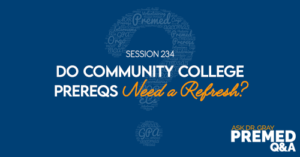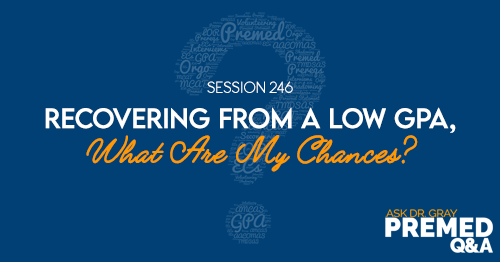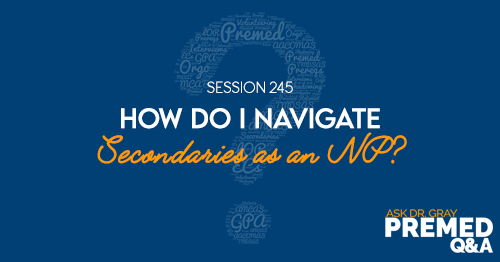Apple Podcasts | Google Podcasts
Session 234
Should you retake all your community college courses at a four-year institution to increase your chances of getting into medical school?
Ask Dr. Gray: Premed Q&A is brought to you by Blueprint MCAT. Listen to this podcast episode with the player above, or keep reading for the highlights and takeaway points.
The episodes in this podcast are recordings of our Facebook Live that we do at 3 pm Eastern on most weekdays. Check out our Facebook page and like the page to be notified. Also, listen to our other podcasts on MedEd Media. If you have any questions, call me at 617-410-6747.
Question of the Day: Should I Retake My Community College Courses at a Four-Year Institution?
This student says:
“I have somewhat of a nontraditional background. I actually went to community college first before going to a four-year school. And going into the application cycle, I’m just a little bit worried that having taken all of my prerequisites at a community college is going to somehow hold back. I’ve seen mixed things on the internet about this. Some people say it doesn’t matter. Others say it does matter.
At one point, a premed advisor told me I should think about retaking all my prereqs at the four-year school I go to now and I just thought that was an overkill. I just wanted to get your take on that.”
Just Show Academic Capability
There are over 200 medical schools in this country, and they all have different processes and biases. They will hold that against you or they won’t. So there isn’t one straightforward answer, unfortunately. The question ultimately is, do you want to retake your courses? Or are you okay with applying to medical schools knowing that some of them will hold that against you?
As for this student, he says he doesn’t want to retake all his courses, and that his performance across the board has been exceptionally strong from a grade perspective.
“As long as you did well at community college and you continue to do well at the four-year university… taking upper-division science courses, you're showing that you can handle it just fine.”Click To TweetOne Course, One Semester Doesn’t Define You
Q: “I did have one really poor semester a few years ago. I did take a few science courses then. Will one course in a semester hold me back? Considering, all my other grades are straight A’s everywhere else, it’s clearly an academic discrepancy.”
A: One grade, one semester, or even one year doesn’t define you. The fact that you have time between when that semester was and now is good. You have more recent evidence supporting that your academic capability is good.
Unless you just had a bad semester and you’re applying to medical school right now, then medical schools would most likely question that. But if you had a bad semester several years ago, and since then you’ve had many good semesters, then it shouldn’t be a problem.
The only place where it may be a problem is if those poor grades that you received are in your prereqs and you don’t have passing grades for the prereqs that are required. In that case, you may need to retake some of those courses. But this is not the case for this student because he has not failed anything.
'One grade, one semester, even one year doesn't define you.”Click To TweetA Higher MCAT Always Helps
Q: “I got a 506 and I’m not that pleased. I do have a very solid GPA in a very rigorous major. How is that going to hurt me?”
A: Each individual medical school reviews their applications the way that they review their applications. If they’re using a rubric to score your application, then the 506 is going to land in whatever scoring category it’s in there. And so, you’re going to get that many points.
“A higher MCAT score always helps – period, end of story.”Click To TweetIf you have really stellar stats and you have an above-average total MCAT score but below-average in terms of the matriculant’s MCAT score, how is that going to hurt you? Again, it just depends on the medical school and how they integrate the MCAT into their process.
Using a Fake Name on Your Personal Statements
- This student is wondering whether he should use fake names of patients when writing his personal statements and other parts of his application.
- When writing your personal statement and activity essays, it is completely acceptable to use a fake name for a patient. It’s important to respect patient privacy and not disclose their real names for HIPAA reasons. You can use a placeholder name in quotes, like “Tom,” to make it more personal and engaging.
-
Projecting Confidence and Authenticity During Your Interviews
- Our student is also wondering if he should cut his hair for the interviews because he doesn’t want to, but he also doesn’t want to rub the interviewers the wrong way.
- It ultimately depends on your personal style and comfort level. While some people might suggest a more conservative appearance for interviews, it’s essential to be true to yourself. If you feel comfortable with your current hairstyle and just want to tidy up, that should be fine. Remember, you want to project confidence and authenticity during your interviews.
The question is: Are you going to be comfortable getting into a place where you can’t be who you are?
As you’re going through the process of looking for schools, refer to the schools’ student handbooks in terms of dress code and other guidelines to see if males are not allowed to have hair past their shoulders. That may easily check off some schools for you.
Will Lack of Research Experience Hurt Your Chances?
Q: “One of the aspects of my application that is lacking is my research experience. I really haven’t gotten involved in anything or any research at all. I’m going to do it next year. But by that point, I already would have sent out my applications. I do have a lot of service hours and a lot of experience in volunteer activities and serving the community and a few hundred hours of the hospital, some active hands-on volunteering. Do you think the lack of research is going to significantly hold my application back? Or do I have other strong points that can carry me across the finish line?”
A: I personally believe research is the most overrated part of the application. Lack of research will basically hold nobody back even at research-heavy institutions. So just be yourself and be authentic.
The fact that you don’t have research is fine. There are other ways to show inquisitiveness and interest in driving forward science without needing to do “research.”
Our student says he was looking at the MSAR in a lot of the schools, and they have over 80% of people having done research. Now, that’s what every student looks at and that’s why they assume you have to have research. But that’s not what that number says at all. It just shows that people are doing research. Most of them are doing research, because they look at the MSAR and they think they have to do research, so they do research. But that number is just a self-fulfilling prophecy.
Links:
Medical School HQ Facebook page
Medical School HQ YouTube channel
Instagram @MedicalSchoolHQ
Join the Application Academy!
The Premed Playbook: Guide to the Medical School Personal Statement
The Premed Playbook: Guide to the Medical School Application Process
SEARCH SITE
LISTEN FOR FREE












